Prerequisite
Before you run the Management Agent installer for IBM i OS/400, you must ensure that iSeries Navigator is installed on the IBM i target machine.
To install the Server Manager Agent on IBMi target machines:
Log on to the Windows machine on which you are running the Server Manager Management Agent installer.
Change to the directory in which you extracted the Server Manager Agent installer as described in the appropriate subsection of this chapter entitled: Distribute and Unzip the Management Agent Installer Application in the subsection entitled: (OS400).
Depending on your Tools release, launch the OUI installer according to these notes:
-
For Tools Release 9.2.2.0 and Greater: A 64-bit JDK or JRE, version 1.8 or later must be installed on the Microsoft Windows machine before starting the Server Manager Agent installer.
For Tools Releases prior to 9.2.2.0: A JDK is included in the installer. A separate one is not required.
For Tools Release 9.2.3.3 and Greater: Microsoft Visual Studio 2017 and 2013 64-bit Redistributables must be installed prior to running the Server Manager Console installer.
For Tools Releases prior to 9.2.3.3: Microsoft Visual Studio 2010 32-bit Redistributables must be installed prior to running the Server Manager Console installer.
One of the following requirements must be met:
For Tools Release 9.2.3.3 and Greater: You must specify the location of the JDK or JRE on the command line. If the location is not specified, the installer will fail immediately.
For Tools Release 9.2.2.0 up to but not including 9.2.3.3: You can specify the location of the JDK or JRE on the command line. If the location is not specified, you will be prompted for it.
For Tools Releases prior to 9.2.2.0: Because a JDK is included in the installer, you will not be prompted for one.
To specify the location of a JDK or JRE on the command line:
Open a Windows Command window with Run as administrator.
Change directory (cd) to the directory in which you unzipped the installer. For example, if you followed the recommendation in Distribute and Unzip the Management Agent Installer Application the command would be:
cd C:\SM_Agent\Disk1\installUse this command to run
setup.exefollowed by the argument-jreLocand the directory to the JDK or JRE:setup.exe -jreLoc C:\PROGRA~1\Java\JRE18~1.0_1Note:Regarding the above command:
Include a space after the
-jreLocargument.The path to the JDK or JRE must be of the Windows short form, which is 8 + 3 format.
The specified JDK or JRE directory must contain this directory and executable:
bin\java.exe
To skip specifying the location of a JDK or JRE on the command line:
Do one of the following:
Follow the instructions above to run from a Windows Command window but without the
-jreLocargument.In Windows Explorer, right-click on
setup.exein the directory in which you unzipped the installer and select Run As Administrator. For example, if you followed the recommendation in Distribute and Unzip the Management Agent Installer Application the file will be located in this directory:C:\SM_Agent\Disk1\install\setup.exe
This process opens a Microsoft Windows command window as shown in the below example.

Tools Release 9.2.2.0 up to but not including 9.2.3.3. If you did not specify the
location of a JDK or JRE using the -jreLoc argument, the installer
prompts you to specify the location of that at a command prompt.
For the 9.2.2.0 and later, the installer will fail if the JDK/JRE is not at least Version 1.8. Upon failure it displays the following error:
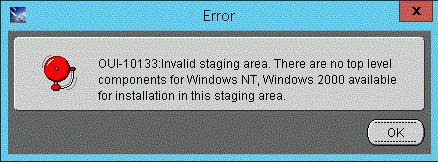
After the installer validates existence of the JDK in the specified location, the OUI installer user interface appears. All further installer behavior remains the same as previous Tools Releases.
Start Here xxxx
On the Microsoft Windows machine where you extracted the
.zipfile, and which is mapped to the IBM i machine, run this file:/Disk1/install/setup.exeNote:The unzipped installer files will be in the location specified in the section of this guide entitled: Distribute and Unzip the Management Agent Installer Application in the subsection entitled: (OS400).
This process opens a Microsoft Windows command window as shown in the below example.

Requirement for Tools Release 9.2.2.0 and Greater. When launching the installer for the Server Manager Agent through
setup.exeorrunInstallerthat is delivered with Tools Release 9.2.2.0 and greater, a prerequisite to run the installer is that you must have preinstalled a 64-bit JDK or JRE, Version 1.8 or later. The installer prompts you to specify the location of that at a command prompt. Note:
Note:For the 9.2.2.0 installer, as the installer runs, it will fail if the JDK/JRE is not at least Version 1.8. Upon failure it displays the following error:

For Tools Release 9.2.2.0 installers, after the installer validates existence of the JDK in the specified location, the OUI installer user interface appears. All further installer behavior remains the same as previous Tools Releases.
After the OUI installer is launched, the command window is closed, and the Welcome screen is displayed.

On Welcome, click the Next button.

On Specify Home Details, complete these fields:
Name:
Enter a name for the Management Agent. The default name is:
EOne_Management_Agent
Path:
The installer automatically detects the root drive location on the Microsoft Windows machine and by default appends this value:
jde_homeNote:Although jde_home is the default and recommended setting, you can specify any value to replace the default value.
The directory that you specify cannot already exist.

On Welcome to Wizard for JD Edwards Server Manager Management Agent, click the Next button.
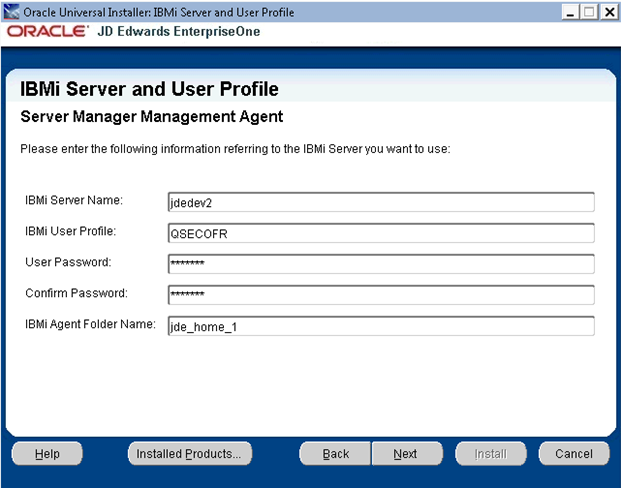
On IBMi Server and User Profile, complete these fields:
IBMi Server Name
Enter the name of your IBM i target server.
IBMi User Profile
Enter the user profile for the IBM i target server on which the Management Agent will be installed.
User Password
Enter the password for the IBM i user profile specified in the previous field.
Confirm Password
Confirm the password for the IBM i user profile specified in the previous field.
IBMi Agent Folder Name
Enter the name of the IBMi Agent Folder.
Click the Next button.
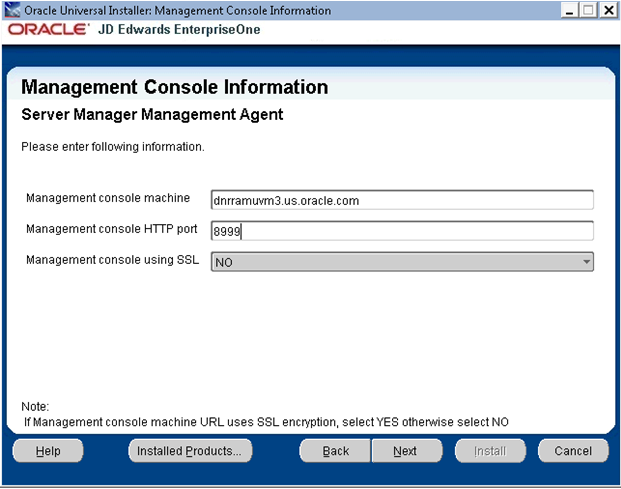
On Server Manager Management Agent, complete these fields:
Management console machine
You must specify the host name of an existing Management Console machine.
The installer verifies the connection to the Management Console during the install. The Management Console machine must be started and the Management Console must be running in order to run the installer. In some cases, depending on your machine, operating systems, or network, you might need to fully qualify your machine name. For example, instead of specifying only
dnrramuvm2you might need to specifydnrramuvm2.mlab.jdedwards.com.Tip:You can determine the name of your Management Console from the information supplied on the Management Agent Installers screen. For navigation, refer to Step 2 in the section entitled: Obtain the Management Agent Installer Application. You can also view the
readme.txtfile in the root directory of the Management Console.
Management console HTTP port
You must specify a valid port of an existing Management Console machine.
The installer verifies the port connection to the Management Console. The machine must be started and the Management Console must be running in order to run the installer.
Tip:You can determine the port of your Management Console from the information supplied on the Management Agent Installers screen. For navigation, refer to Step 2 in the section entitled: Obtain the Management Agent Installer Application.

Management console Using SSL
Select:
YES - SMC runs on SSL
NO - SMC does not run on SSL
-
Specify if the Management Console is using Secure JMX.

-
Click the Next button to verify the machine and port values.
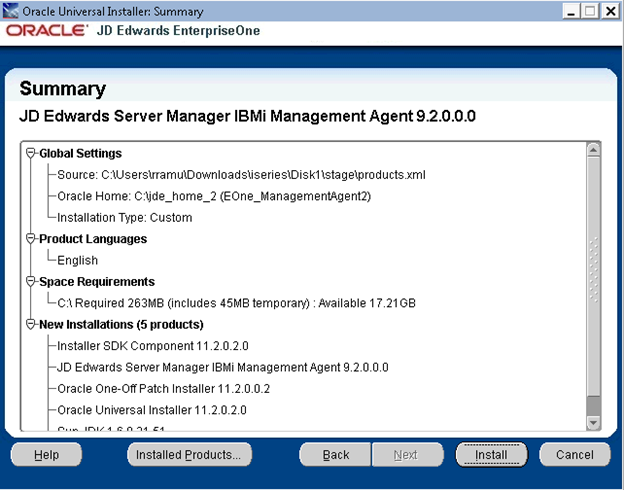
On Summary, review the information and click the Install button to begin the installation.
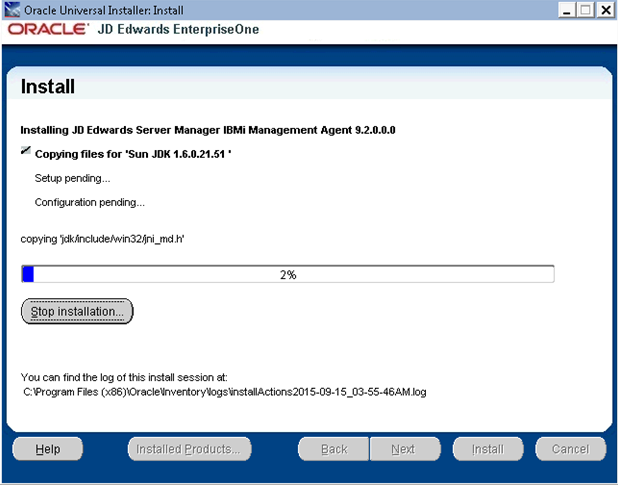
The Management Agent installer displays a panel showing the ongoing status of the installation.

When the installation finishes, the End of Installation screen is displayed.
Caution:Examine the Installer Logs. This screen also displays the location of the install log. Even though the screen indicates that the installation was successful, you should always check the logs before you attempt to run the Agent. The file name starts with "installActions" and includes a time stamp; it is located in
C:\oraInventory\logsdirectory. For example:CC:\Program Files\Oracle\Inventory\logs\installActions2018-11-09_01-21-51PM.logClick the Exit button.

On the Exit dialog, click the Yes button to confirm you want to exit the Management Agent installer.
At the end of the installation of the Management Agent installer for OS/400, an agent installation directory will exist in the IFS directory root on the IBM i machine. The name of the directory is:
jde_home_x_Agent
where "x", if it exists, is the numeric value to differentiate the jde_home if multiple agents exist on this machine.
For example, the IFS structure for the Management Agent install might look like this:
